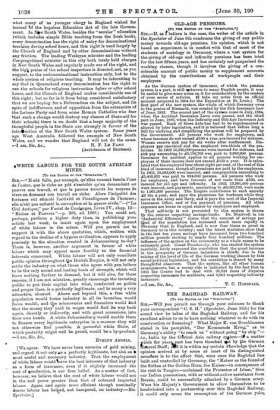',WHITE LABOUR FOR THE SOUTH AFRICAN MINES.
[To vas EDITO8 OF THM "Srsorrroli."]
eat fallu, par exemple, qu'ellea eussent besoin l'une de l'autre, que Is riche ne put s'enrichir qu'en demandant au pauvre son travail, et que is pauvre trouvat lea moyens de vivre en donnant son travail an riche. Alors rinegalite des fortunes eat stimule l'activite et l'intelligence de rhomme; elle n'efit pas enfants la corruption et la guerre civile."—(" La Cite Antique," par Fustel de Coulenges, Livre IV., chap. 12— "Riches et Pauvres "—p. 398, ed. 1888.) You could not, perhaps, perform a higher duty than, in publishing your article last week, to insist again upon the employment of white labour in the mines. i Will you permit me to support it with the above quotation, which, written with regard to the decline of a bygone civilisation, appears to apply precisely to the situation created in Johannesburg to-day P There is, however, another argument in favour of white labour which may appeal more forcibly to the financial interests concerned. White labour will not only conciliate public opinion throughout lie British Empire, it will not only settle the industry on what those who agree with you believe to be the only sound and lasting basis of strength, which will leave nothing further to demand, but it will also, for these reasons, if I am not mistaken, greatly encourage the investing public to put their capital into what, conducted on politic and proper lines, is a perfectly legitimate, and to many a very attractive, channel. Above and beyond this, a free white population would foster industry in all its branches, would focus wealth, and the mineowners and financiers would find that the money they paid in wages would. find its way back again, directly or indirectly, and with great accessions, into their own hands. A white Johannesburg would enable them to finance every legitimate enterprise in a manner they will not otherwise find possible. A powerful white State, of which posterity might well be proud, would be a by-product.
[We agree. We have never been enemies of gold mining, , and regard it not only gs a perfectly legitimate, but alto', as • most useful and necessary industry. That the employment of white lhbour wduldlierve the best interests of that industry as a form of insurance, even if it slightly increased the cost of croduction, is our firm belief. As a matter of fact, however, we believe that the cost of white labour would not in the end prove greater than that of coloured imported labour. Again and again more efficient though nominally dearer labour has helped, not hampered, an industry.—En. Spectator.]


























































 Previous page
Previous page